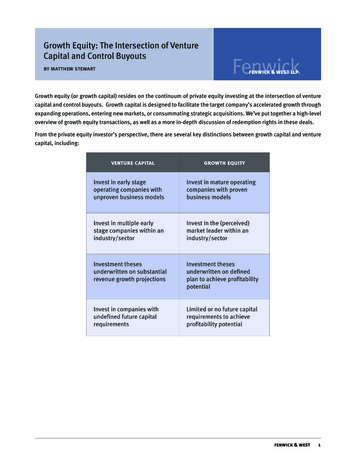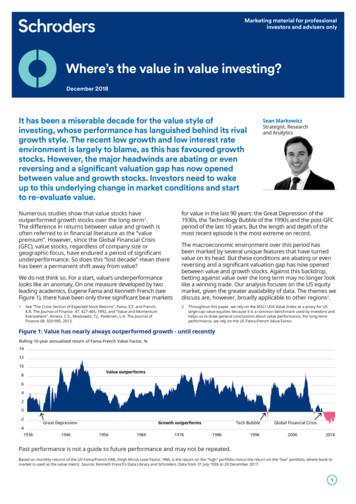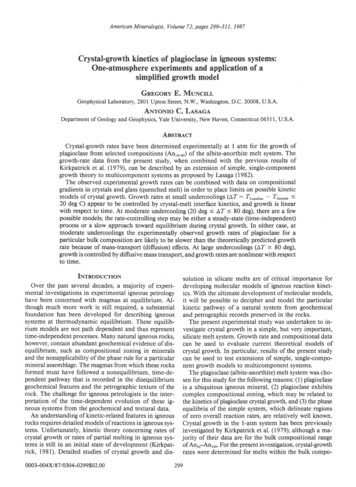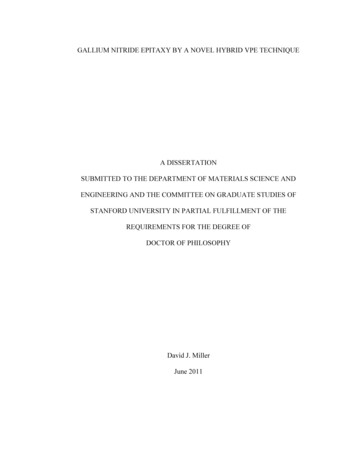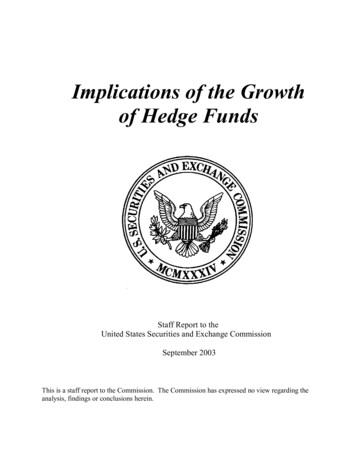
Transcription
Implications of the Growthof Hedge FundsStaff Report to theUnited States Securities and Exchange CommissionSeptember 2003This is a staff report to the Commission. The Commission has expressed no view regarding theanalysis, findings or conclusions herein.
September 29, 2003Hedge funds, while representing a relatively small portion of the U.S. financialmarkets, have grown significantly in size and influence in recent years. In June 2002, the staffof the Commission’s Division of Investment Management and Office of ComplianceInspections and Examinations undertook a fact-finding mission aimed at reviewing theoperations and practices of hedge funds.After last spring’s two-day roundtable on the hedge fund industry, I asked the staff tosummarize its findings in a report to the Commission. I also asked the staff to includerecommendations about actions that, in the judgment of the staff, the Commission mightconsider when addressing issues that the staff raised in its report. The substance and thelanguage of the report represent the views of the staff. They do not represent the views of theCommission or of any individual Commissioner.I look forward to reviewing the staff’s report and accompanying recommendations withmy fellow Commissioners. The staff has raised important issues for the Commission’sconsideration. I anticipate that we will hear strong views both in support of and in oppositionto the staff’s recommendations. We intend to consider these comments carefully as wecontinue to deliberate the appropriate extent of Commission oversight of the hedge fundindustry.William H. Donaldson
ACKNOWLEDGEMENTSThe Division of Investment Management had the able assistance of many members of theCommission staff in its study of hedge funds and preparation of this Report, including, inparticular, the staff of the Office of Compliance Inspections and Examinations. The study andpreparation of the Report were conducted under the supervision of Paul F. Roye, Director of theDivision of Investment Management. Much of the study’s field work and document review wasconducted under the supervision of Lori A. Richards, Director of the Office of ComplianceInspections and Examinations.The study team from the Division of Investment Management included:Cynthia M. Fornelli, Deputy Director; Elizabeth G. Osterman, Assistant Chief Counsel (TeamLeader); Evan Geldzahler, Special Counsel (Deputy Team Leader); Jennifer B. McHugh, SeniorAdvisor to the Division Director; Lily R. Chiu, Senior Counsel; Wendy F. Friedlander, SeniorCounsel; Martin Kimel, Senior Counsel; Stephan N. Packs, Senior Counsel; and RochelleKauffman Plesset, Senior Counsel.The study team from the Office of Compliance Inspections and Examinations included:Gene A. Gohlke, Associate Director for Investment Company/Investment Adviser Examinationsand Oversight; Mavis Kelly, Branch Chief; Brian H. Snively, Staff Accountant; Karen A.Stevenson, Staff Accountant; Lesley M. Ward, Staff Accountant; Mary Ann Gadziala, AssociateDirector/Broker-Dealer Examinations and Oversight; and Christine M. Sibille, Senior Counsel.Many other members of the Division of Investment Management contributed to thedrafting or editing of various sections of the report, including: Robert E. Plaze, AssociateDirector; Barry D. Miller, Associate Director; Jennifer L. Sawin, Assistant Director; Michael A.Lainoff, Assistant Director; Brian D. Bullard, Chief Accountant; Paul B. Goldman, AssistantDirector; Edward J. Rubenstein, Senior Special Counsel; Karen L. Goldstein, Advisor to theDivision Director; James G. Basham, Special Counsel; John M. Ganley, Senior Counsel; VivienLiu, Senior Counsel; Susan M. Olson, Senior Counsel; Hester M. Peirce, Senior Counsel; Eric S.Purple, Senior Counsel; Jacquelyn J. Rivas, Accountant; Ernest J. C’DeBaca, Attorney-Advisor;Catherine E. Marshall, Attorney-Advisor; and Robert L. Tuleya, Attorney-Advisor.Many members of other Divisions and Offices also made significant contributions indrafting, reviewing and commenting on the report, including: Alan L. Beller, Director, Divisonof Corporation Finance; Mauri L. Osheroff, Associate Director; Amy M. Starr, Senior SpecialCounsel; Brian V. Breheny, Office Chief; Gerald J. Laporte, Office Chief; Julia E. Griffith,Special Counsel; Nicholas P. Panos, Special Counsel; John J. Mahon, Attorney-Advisor; AnnetteL. Nazareth, Director, Division of Market Regulation; Robert L.D. Colby, Deputy Director;Elizabeth K. King, Associate Director; Theodore R. Lazo, Senior Special Counsel; Mark M.Attar, Special Counsel; Brian R. Baysinger, Special Counsel; Kevin Campion, Special Counsel;Christopher Slogan, Attorney-Advisor; Laurie M. Stegman, Senior Advisor to the DivisionDirector, Division of Enforcement; Ethiopis Tafara, Director, Office of International Affairs;Bridgett M. Neill, Senior Policy Advisor; Elizabeth Jacobs, Assistant Director; Stan Marcel,Senior Counsel; Susan F. Wyderko, Director, Office of Investor Education and Assistance;
Lawrence E. Harris, Chief Economist; Jonathan S. Sokobin, Deputy Chief Economist; Lori S.Walsh, Financial Economist; Ira Wein, Financial Economist; Harvey B. Westbrook, FinancialEconomist; Barbara D. Waits, Financial Analyst; and Jill Felker, Senior Counsel, Office of theGeneral Counsel.Many other Commission staff members provided ideas, energy and input thatsignificantly enhanced this Report. While their names are too numerous to list, theircontributions are nonetheless greatly appreciated.ii
TABLE OF CONTENTSIMPLICATIONS OF THE GROWTHOF HEDGE FUNDSEXECUTIVE SUMMARY . . .viiI.Investigation by the Staff of the Commission. 1II.Legal Structure and Benefits of Hedge Funds . 3A.What is a Hedge Fund. 3B.Market Benefits of Hedge Funds . 4C.Pooled Investment Vehicles that Are Not Hedge Funds . 51.Registered Investment Companies . 52.Private Equity Funds . 73.Venture Capital Funds . 84.Commodity Pools . 8D.Domestic and Offshore Hedge Funds . 91.Domestic Hedge Funds. 92.Offshore Hedge Funds. 10III.The Regulation of Hedge Funds and Their Advisers. 11A.Hedge Funds and the Investment Company Act of 1940 . 111.Section 3(c)(1) . 112.Section 3(c)(7) . 12
B.Hedge Funds and the Securities Act of 1933. 131.The Private Offering Exemption of the Securities Act. 142.Regulation D. 14C.Hedge Funds and the Securities Exchange Act of 1934 . 181.Definition of “Broker” and “Dealer”. 182.Exchange Act Registration Under Section 12 . 183. Beneficial Ownership Reporting under Sections 13 and 16 of the Exchange Act 19D.Hedge Fund Advisers and the Investment Advisers Act of 1940. 20E.Certain Other Regulatory Requirements. 231.Regulation under the CEA. 232.NASD Regulation. 253.Regulation under ERISA . 284.Treasury Department Regulations . 295.State Regulation. 31IV.Operations of Hedge Funds . 33A.Hedge Fund Investment Strategies . 331.Overview . 332.Hedge Funds Strategies . 343. Hedge Fund Investment Activities Compared to those of Registered InvestmentCompanies. 364.Leverage . 37ii
5.Short Selling . 39B.Nature of Hedge Fund Investors . 43C.Hedge Fund Marketing . 44D.Disclosure by Hedge Funds to Investors and Prospective Investors . 461.Private Placement Memoranda. 472.Limited Partnership Agreements . 493.Transparency . 494.Periodic Reporting. 505.Additional Sources of Hedge Fund Information . 51E.Hedge Fund Service Providers. 521.Hedge Fund Investment Advisers . 522.Broker-Dealers/Prime Brokers . 533.Offshore Administrators . 554.Auditors . 575.Consultants and Other Finders . 59F.Hedge Fund Advisory Fees. 61G.Hedge Fund Valuation Practices. 64H.Audit Reports . 65I.Risk Management . 66J.Funds of Hedge Funds . 67iii
1.Background. 672.Registered FOHFs . 683.Repurchases . 714.Content of Registered FOHF Disclosure. 71V.Hedge Fund Enforcement Actions . 72A.Commission Actions. 72B.State and SRO Enforcement Activities. 74VI.Concerns . 76A.1.Lack of Commission Regulatory Oversight . 76Inability to Detect Fraud and Other Misconduct at Early Stages . 762. Lack of Meaningful Information about Hedge Funds and Hedge Fund Advisers 77B.Valuation of Hedge Fund Portfolio Securities. 79C.Retailization . 801.Direct Investment in Hedge Funds . 802.Registered Funds of Hedge Funds. 813.Pension Plan and Other Institutional Investment in Hedge Funds . 82D.Disclosure . 83E.Conflicts of Interests . 831.Side-by-Side Management of Client Accounts . 832.Relationships with Prime Brokers . 85iv
F.Concerns about General Solicitation . 86G.Concerns about Whether the Federal Securities Laws and Regulations AreImpairing the Investment Activities of Registered Investment Companies . 87VII.Recommendations. 88A.The Commission Should Consider Requiring Hedge Fund Advisers to Register asInvestment Advisers under the Advisers Act, Taking into Account Whether theBenefits Outweigh the Burdens of Registration . 891.Benefits of Mandatory Registration . 922.Concerns about Mandatory Registration . 96B.The Commission Should Consider Revising its Regulations Under the AdvisersAct to Require Advisers to Provide a Brochure Specifically Designed for HedgeFunds. 97C.The Commission Should Consider Requiring Certain Registered InvestmentCompanies to Follow Board Adopted Valuation Procedures . 99D.The Commission Should Consider Requiring Additional Disclosure to beProvided About Layered Fees of “Funds of Funds”. 99E.Regulators Should Continue to Monitor Whether Suitability Obligations AreBeing Met. 100F.The Commission Should Consider Permitting General Solicitation in Section3(c)(7) Hedge Fund Offerings . 100G.Monitor Capital Introduction Services Provided by Prime Brokers . 101H.Encourage the Hedge Fund Industry to Embrace and Further Develop BestPractices . 101I.Investor Education . 103VIII.The Commission Should Consider Issuing a Concept Release for ExaminingWider Use of Hedge Fund Investment Strategies in Registered InvestmentCompanies. 103v
A.Different Registered Investment Company Structures Provide Various Benefitsand Challenges in the Deployment of Absolute Return Strategies. 104B.Registered Investment Companies are Subject to Restrictions on Leverage andShort Selling that Hedge Funds Avoid . 107C.Alignment of the Investment Adviser’s Interests with Investors. 109D.Absolute Return Strategies May Challenge Traditional Investor Expectations . 110Appendix A -- Summary of the Commission’s Previous Studies or Investigations ofHedge fundsvi
EXECUTIVE SUMMARYI.Background on Report of the Implications of the Growth of Hedge FundsAt the request of the Commission, the staff has conducted a study of hedge funds,including their investment advisers and other service providers and their investors. TheCommission’s decision to study the hedge fund industry was based, in large part, on the growthof hedge fund assets coupled with the Commission’s lack of information about these investmentpools. The hedge fund industry recently has experienced significant growth in both the numberof hedge funds and the amount of assets under management. Based on current estimates, 6,000to 7,000 hedge funds operate in the United States managing approximately 600 to 650 billionin assets. In the next five to ten years, hedge fund assets have been predicted to exceed 1trillion.The growth in hedge funds has been fueled primarily by the increased interest ofinstitutional investors such as pension plans, endowments and foundations seeking to diversifytheir portfolios with investments in vehicles that feature absolute return strategies – flexibleinvestment strategies which hedge fund advisers use to pursue positive returns in both decliningand rising securities markets, while generally attempting to protect investment principal. Inaddition, funds of hedge funds (“FOHF”), which invest substantially all of their assets in otherhedge funds, have also fueled this growth.The study focused on a number of key areas of staff concern, including the recentincrease in the number of hedge fund enforcement cases, the role that hedge funds play in ourfinancial markets and the implications of the Commission’s limited ability to obtain basicinformation about hedge funds. The staff also examined the emergence of registered FOHFs –FOHFs that register under the Investment Company Act of 1940 (“Investment Company Act”)so that they may offer and sell their securities to a larger number of investors and FOHFs thatregister under the Investment Company Act and the Securities Act of 1933 (“Securities Act”) sothat they may offer and sell their securities in the public market. Finally, the staff reviewedhedge fund disclosure and marketing practices, valuation practices and conflicts of interest.The study commenced with the staff’s review of 65 hedge fund advisers (both registeredand unregistered) managing approximately 650 different hedge funds with over 160 billion ofassets. This phase of the study included a number of on-site visits to hedge fund advisers, whichwere selected to provide a representative cross-section of the industry. The staff also visitedseveral broker-dealers offering prime brokerage services to hedge funds and conducted aseparate series of on-site examinations focused on the operations of registered FOHFs. Inaddition, the staff met with hedge fund advisers, investors, regulators and industry observerswilling to share information about hedge funds.Complementing the study, the Commission held a Hedge Fund Roundtable on May 14and 15, 2003, and invited a broad spectrum of the hedge fund industry and interested persons toparticipate in a discussion of hedge fund issues. At the close of the Roundtable, Chairmanvii
William H. Donaldson requested that the staff provide the Commission with a report of itsfindings and recommendations resulting from the hedge fund study. In response, the Division ofInvestment Management, with the assistance of the Divisions of Corporation Finance,Enforcement and Market Regulation, and the Offices of Compliance Inspections andExaminations, Economic Analysis, International Affairs and Investor Education and Assistance,has prepared this Report. The Chairman also requested public comment on the issues discussedin the Roundtable. The Commission received approximately 80 comment letters in response andthose letters have been considered in preparing this Report.The Report outlines the staff’s factual findings, identifies concerns and recommends thatthe Commission should consider certain regulatory and other measures to improve the currentsystem of hedge fund regulation and oversight. The views expressed in this Report are those ofthe staff and do not necessarily reflect the views of the Commission or the individualCommissioners.A.Characteristics of Hedge FundsAlthough financial service providers, regulators and the media commonly refer to “hedgefunds,” the term has no precise legal or universally accepted definition. The term generallyidentifies an entity that holds a pool of securities and perhaps other assets that does not registerits securities offerings under the Securities Act and which is not registered as an investmentcompany under the Investment Company Act. Hedge funds are also characterized by their feestructure, which compensates the adviser based upon a percentage of the hedge fund’s capitalgains and capital appreciation. Hedge fund advisory personnel often invest significant amountsof their own money into the hedge funds that they manage. As discussed in the Report, althoughsimilar to hedge funds, there are other unregistered pools of investments, including venturecapital funds, private equity funds and commodity pools that generally are not categorized ashedge funds.The investment goals of hedge funds vary among funds, but many hedge funds seek toachieve a positive, absolute return rather than measuring their performance against a securitiesindex or other benchmark. Hedge funds utilize a number of different investment styles andstrategies and invest in a wide variety of financial instruments. Hedge funds invest in equity andfixed income securities, currencies, over-the-counter derivatives, futures contracts and otherassets. Some hedge funds may take on substantial leverage, sell securities short and employcertain hedging and arbitrage strategies. Hedge funds typically engage one or more brokerdealers to provide a variety of services, including trade clearance and settlement, financing andcustody services.Hedge funds often provide markets and investors with substantial benefits. For example,based on our observations, many hedge funds take speculative, value-driven trading positionsbased on extensive research about the value of a security. These positions can enhance liquidityand contribute to market efficiency. In addition, hedge funds offer investors an important riskmanagement tool by providing valuable portfolio diversification because hedge fund returns inmany cases are not correlated to the broader debt and equity markets.viii
B.Hedge Fund Organization and OperationsHedge funds are typically organized by professional investment advisers that manage ahedge fund’s investments. Hedge funds distribute securities in private offerings, traditionally“marketing” their interests through word of mouth and the personal relationships with the hedgefund’s advisory personnel. Broader marketing, including use of the Internet, has become morefrequent in recent years. Hedge funds generally do not have limited time horizons, although anumber of factors, including an inability to consistently achieve positive returns, often contributeto a relatively shorter life span than that of other investment vehicles. Hedge fund adviserstypically receive, as compensation, a management fee based on the amount of hedge fund assets(commonly 1-2 percent), plus a share of the capital gains and capital appreciation (commonly 20percent) or some other allocation based on the fund’s investment performance. Hedge fundstypically agree to repurchase their own interests from investors on a limited, periodic basis, suchas quarterly, often following an initial “lock-up period” during which time investors are notpermitted to liquidate their investments.Because hedge funds are not registered investment companies, they generally are notrequired to meet prescribed disclosure requirements. Hedge fund advisers, however, typicallyprovide potential hedge fund investors with a private placement memorandum that disclosesinformation about the investment strategies the hedge fund is permitted to use and an overviewof how the hedge fund operates. The private placement memorandum also generally providesthe adviser with the maximum flexibility in selecting, shifting and modifying its strategies. Inaddition, the private placement memorandum often provides the hedge fund adviser with broaddiscretion in valuing the hedge fund’s assets. Hedge fund investors generally receive someongoing performance information, risk analyses and portfolio profiles from their hedge fundadvisers. Although not required, most hedge funds retain an auditor to conduct an annualindependent audit, which, if certified, is prepared using generally accepted accounting principles.For tax and other considerations, some hedge fund advisers create one or more “offshore”hedge funds that are organized in a foreign jurisdiction, in addition to maintaining U.S.-basedhedge funds. In many cases, an offshore hedge fund is managed using trading strategies that aresubstantially similar to those used to manage an onshore hedge fund managed by the sameadviser. These hedge funds are offered and sold to certain U.S. investors as well as foreigninvestors.C.Principal Exclusions and Exemptions for Hedge Funds and Their InvestmentAdvisersTo avoid registration and substantive regulation under the Investment Company Act,hedge funds rely on one of two exclusions from the definition of investment company. The firstexclusion is available to hedge funds that have 100 or fewer investors. The second exclusionapplies to hedge funds that sell their interests only to highly sophisticated investors. To rely oneither exclusion, the hedge fund must restrict its offerings so that they meet the requirements fornon-public offerings.ix
Hedge funds do not register the offer and sale of their interests under the Securities Act.As such, hedge funds may not offer their securities publicly or engage in a public solicitation.Instead, hedge funds generally sell their interests in private offerings. To meet the mostcommonly used regulatory “safe harbor” for conducting private offerings, hedge funds may selltheir interests to an unlimited number of “accredited investors.” Accredited investors includeindividuals with a minimum annual income of 200,000 ( 300,000 with spouse) or 1 million innet worth and most institutions with 5 million in assets. Hedge funds that seek to rely on thesophisticated investor exclusion from Investment Company Act registration may sell theirinterests only to “qualified purchasers,” a standard with significantly higher financialrequirements than those necessary for accredited investors. In practice, we understand that mosthedge funds sell only to investors whose wealth exceeds that required to meet the standardestablished for accredited investor status.Although some hedge fund advisers choose to register voluntarily, or are registered foranother reason, most advisers to hedge funds do not register under the Investment Advisers Actof 1940 (“Advisers Act”). They often rely on the “de minimis” exemption from registration forinvestment advisers with 14 or fewer clients. Under Commission rules, each hedge fund countsas one client.II.Concerns Relating to Hedge Fund GrowthAs noted above, our study was, in large part, the result of the Commission’s recognitionthat it lacks information about hedge fund advisers that are not registered under the Advisers Actand the hedge funds that they manage. Although this recognition is not new, the Commission’sattention was focused again on the hedge fund industry as a result of the recent growth of theindustry and the increase of investments in hedge funds by institutions. Although hedge fundinvestment advisers are subject to the antifraud provisions of the federal securities laws, they arenot subject to any reporting or standardized disclosure requirements, nor are they subject toCommission examination. Consequently, the Commission has only indirect information aboutthese entities and their trading practices and, we believe, is hampered in its ability to developregulatory policy as hedge funds become more important participants in our financial markets.We are concerned about our inability to examine hedge fund advisers and evaluate the effect ofthe strategies used in managing hedge funds on our financial markets. We also are concernedabout the lack of applicable regulatory measures necessary to ensure that material information toassist investors in making fully informed investment decisions is available.The Commission’s inability to examine hedge fund advisers has the direct effect ofputting the Commission in a “wait and see” posture vis-à-vis fraud and other misconduct. TheCommission typically is able to take action with respect to such fraud an
Hedge funds, while representing a relatively small portion of the U.S. financial markets, have grown significantly in size and influence in recent years. In June 2002, the staff of the Commission’s D


